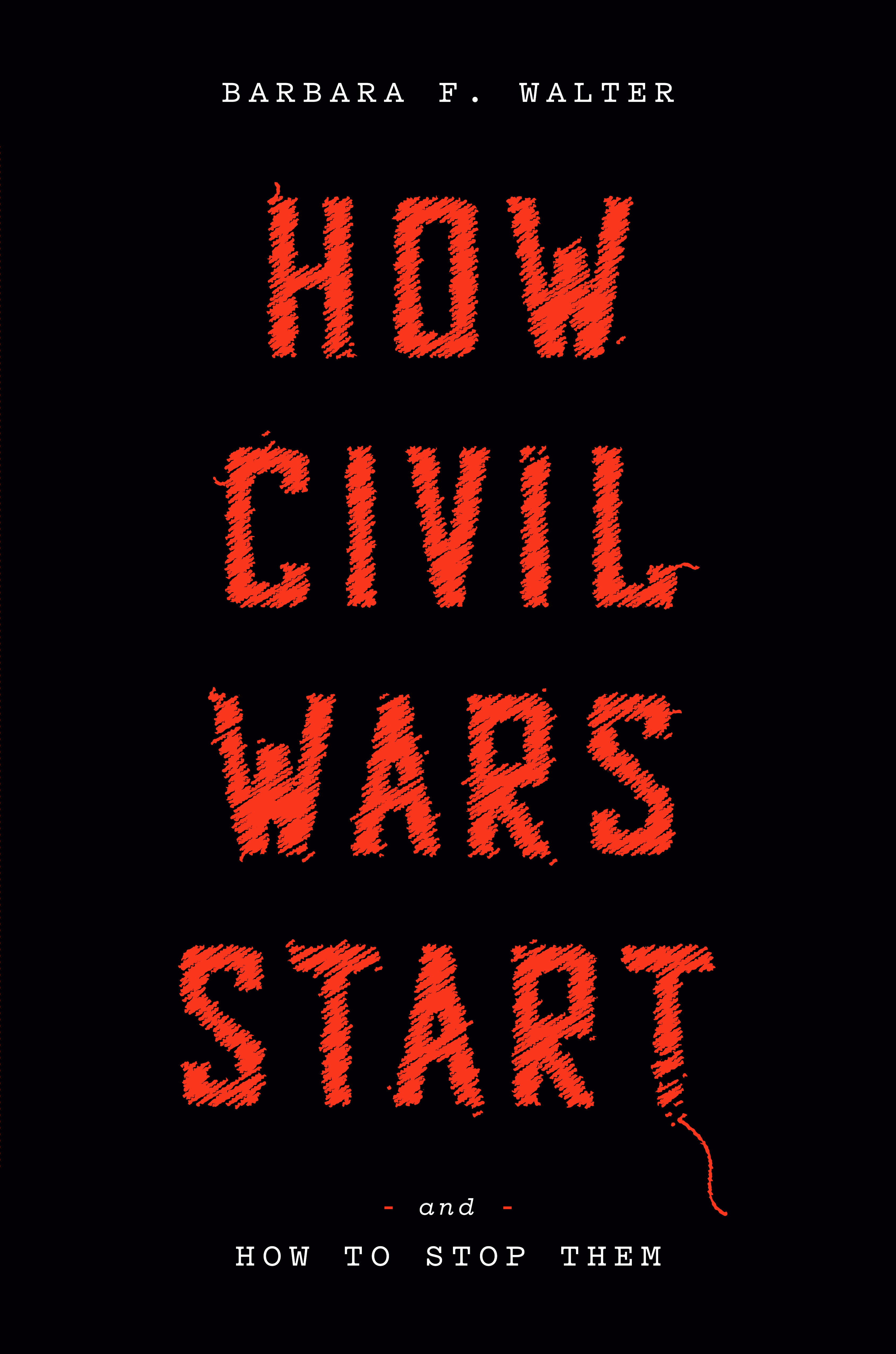
How Civil Wars Start: And How to Stop Them
Barbara F. Walter
About the Author

Barbara F. Walter
Questions & Answers
The key risk factors for civil war outbreaks include:
- Anocracy: Weak, disorganized governments struggling with internal divisions and unable to deliver basic services or security, as seen in transitioning democracies.
- Factionalism: Political parties based on ethnic, religious, or racial identity, leading to total domination and exclusion of others, as in Yugoslavia.
- Downgrading: Groups feeling politically and culturally diminished, often due to losing power or status, as with the Serbs in Croatia and Bosnia.
- Economic Factors: Inequality, economic discrimination, and modernization can exacerbate existing anger and resentment, as in the Donbas region of Ukraine.
- Political Manipulation: Leaders exploiting fears and manipulating divisions to consolidate power, as seen with Narendra Modi in India.
In modern American society, these factors manifest through:
- Anocracy: The rise of anocracy in the U.S. with increasing political polarization and weakening institutions.
- Factionalism: Identity politics and the rise of ethnonationalist leaders, as seen in the 2020 election aftermath.
- Downgrading: Groups feeling marginalized, such as racial and religious minorities, leading to increased resentment.
- Economic Factors: Growing economic inequality and the impact of globalization on job markets and cultural identity.
- Political Manipulation: Leaders exploiting fears and misinformation to consolidate power, as demonstrated by the Trump administration.
Political polarization and the rise of factions significantly contribute to the escalation of civil wars by fostering deep divisions within societies. When political parties are based on ethnic, religious, or racial identities rather than ideology, they often seek to dominate at the expense of others, leading to rigid boundaries and intense competition. This competition can escalate into violence as factions vie for power, with leaders often appealing to nationalism to maintain their base.
The implications for democratic stability are severe. In anocracy, where institutions are weak and manipulated, factions can gain influence, leading to a breakdown in governance and the rule of law. Failed protests, as seen in Northern Ireland and Palestine, can erode hope and incentivize violence, pushing moderate factions to adopt more radical tactics. Social media exacerbates these divisions by spreading misinformation and hate speech, radicalizing individuals and groups.
Moreover, the increasing polarization in democracies like the United States can lead to a similar scenario, with the potential for civil conflict. The rise of far-right militias and the normalization of extreme rhetoric by political leaders threaten the fabric of democratic institutions. To maintain stability, it is crucial to address these issues by promoting inclusive governance, regulating social media, and fostering a culture of dialogue and compromise.
Social media and technology exacerbate tensions and fuel civil wars by:
- Spreading Misinformation and Disinformation: Unregulated platforms allow the spread of false information, which can inflame ethnic, racial, and religious tensions.
- Facilitating Radicalization: Social media platforms can radicalize individuals by promoting extreme ideologies and providing a platform for violent extremists.
- Amplifying Superfactions: They amplify the voices of ethnic entrepreneurs, reinforcing divisions and promoting narrow tribal agendas.
- Facilitating Organized Violence: Social media enables the organization and coordination of violent groups, including recruitment and fundraising.
To mitigate these issues:
- Regulate Social Media: Governments should regulate social media platforms to prevent the spread of misinformation and disinformation.
- Promote Digital Literacy: Educate users about identifying and combating misinformation.
- Encourage Responsible Use: Platforms should implement algorithms that prioritize accurate information and promote constructive dialogue.
- Support Peacebuilding Efforts: Use technology to support peacebuilding initiatives, such as promoting dialogue and reconciliation.
To strengthen democratic institutions and reverse democratic decay, several strategies are crucial:
-
Governance Improvement: Enhance the rule of law, ensure government effectiveness, and promote voice and accountability. This includes reforming electoral systems, ensuring fair representation, and combating corruption.
-
Education and Awareness: Implement civic education programs to inform citizens about their rights and responsibilities, fostering a well-informed electorate capable of participating in democratic processes.
-
Social Media Regulation: Limit the spread of disinformation and hate speech on social media platforms to reduce factionalism and prevent the radicalization of citizens.
-
Addressing Economic Inequality: Invest in social services, healthcare, education, and infrastructure to reduce economic disparities and improve the quality of life for all citizens.
-
Promoting Bipartisanship: Encourage cooperation between political parties to address national issues and avoid the polarization that can lead to civil conflict.
-
Electoral Reforms: Implement measures like automatic voter registration and address gerrymandering to ensure fair and representative elections.
-
Counter-Terrorism Measures: Tackle domestic terrorism and violent extremism by investing in intelligence, law enforcement, and community engagement.
By implementing these strategies, countries can build stronger democratic institutions, foster a sense of national unity, and reduce the risk of civil war.
Identity and ethnicity play significant roles in the outbreak of civil wars. When political leaders exploit ethnic divisions, they can exacerbate tensions and lead to conflict. This often occurs in anocracies, where weak governance allows for the rise of identity-based political parties. These parties, often led by ethnic entrepreneurs, use fear-mongering and discriminatory policies to gain power, further dividing society.
To navigate the challenges of diversity and integration, societies must:
- Strengthen governance: By improving the rule of law, accountability, and government effectiveness, countries can reduce the risk of conflict.
- Promote inclusive policies: Ensuring that all groups have access to resources and opportunities can help prevent resentment and conflict.
- Counteract ethnic entrepreneurs: Governments and civil society must challenge divisive rhetoric and promote dialogue and understanding.
- Foster national identity: Encouraging a sense of shared national identity can help bridge divides and promote social cohesion.
By addressing these challenges, societies can build more resilient and integrated communities, reducing the risk of civil war.